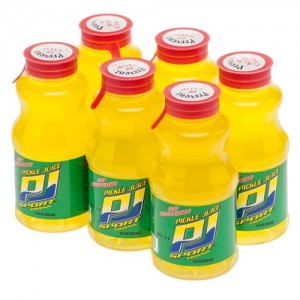Pickle Juice To Stop Cramps
Muscle cramps can bring the strongest of athletes to his or her knees in just an instant. One minute you’re running along at a race pace and the next, your leg is overcome with an intense, clinching and unyielding pain.
Or, throughout a race, you can feel the sensation of a cramp coming on. You do everything you can to keep it at bay – change your stride, allow other muscles to do more work and take up the slack, slow your pace.
Unfortunately, it’s not always clear to us why muscle cramps occur. There are hypotheses regarding hydration, electrolytes, bike-fit, form, over-training, and more. There are plausible reasons they seem to happen more in races than in training, when you’re pushing your body hardest. They also seem to plague some athletes more than others.
Although there may not be answers as to why they occur in every situation, there are some very interesting remedies emerging in research and in practice.
If you’ve ever considered mustard, pickle juice, or vinegar as perfect training fuel, you may just be onto something. Here’s the skinny on how these common foods may be just what the sports nutritionist ordered for your cramping muscles.
The Research:
Believe it or not, pickle juice can relieve muscle cramps effectively and quickly. Surprised? Most people are. While there has been research and anecdotes dating back a couple decades to support pickle juice as a cramp reliever, a newer study was published in 2013 that showed pickle juice relieved cramps 45 percent and 37 percent faster than no intake or water, respectively.
Of course, the first thought is that the fluids and sodium are the obvious agents. However, other studies have concluded that the plasma volume and plasma concentrations of sodium have remained unchanged after pickle juice consumption, leading researchers to believe something else is causing the cessation of the cramps. Essentially, the cramps are stopping before the pickle juice has had a chance to be digested and absorbed.
Interestingly, most experts believe it’s the vinegar.
Vinegar is a very interesting food. Folk medicine has attributed everything from weight loss to increased energy to increased metabolism to the properties of this ancient condiment. For the purposes of stopping muscle cramps, it’s believed that the vinegar triggers a reflex that alerts our brains to tell our muscles to stop contracting and to relax. And, it’s believed to begin as soon as the vinegar touches receptors in the mouth. This means very fast cramp relief!
 If you’re interested in giving pickle juice a try, you can simply bring a small amount of pickle juice with you on your next run or ride (2 ounces is usually enough). Or, you can try “Pickle Juice Sports Drink.” You can even use smaller amounts in relish or pickle packets.
If you’re interested in giving pickle juice a try, you can simply bring a small amount of pickle juice with you on your next run or ride (2 ounces is usually enough). Or, you can try “Pickle Juice Sports Drink.” You can even use smaller amounts in relish or pickle packets.
Not so sure about the pickle juice? Mustard also contains vinegar in smaller, but potentially effective amounts. Although mustard has not been as well studied as pickle juice, there is plenty of anecdotal evidence out there among athletes to give it a try. Many say just one packet is enough to stop cramps in their tracks. Fortunately, packets of mustard or honey mustard are portable on the trail or road and often easier to quickly consume than pickle juice. Mustard also provides turmeric which is great for muscle soreness and inflammation and has up to 100 mg sodium per packet.
Beyond the cramps, there are a couple more beneficial attributes to pickle juice and mustard:
1) Sodium: Although sodium is not the nutrition star of this article, it is still an electrolyte that is strongly recommended as part of your training nutrition regimen. Adequate intake can also improve hydration and reduce cramping, at least in practice. Just 1 tablespoon mustard has 200 milligrams sodium, 2 ounces pickle juice has 400+ milligrams sodium, and 2 ounces Pickle Juice Sports Drink has about 225 milligrams sodium.
2) Glycogen Replenishment: It’s always important to remember that our bodies are wonderfully complex and real foods often support them best in replenishing muscles and recovery. Somehow, it seems that vinegar promotes energy production and glycogen replenishment, at least in animal studies. Vinegar, which is chemically known as acetic acid, can provide the acetyl group that is a fundamental building block during the Krebs Cycle, metabolizing carbohydrates and fat to produce energy/ATP for cells.
Folk-medicine meets science meets training. Sometimes, even ancient ingredients can still surprise us. Have you tried pickle juice, Pickle Juice Sport, mustard, or vinegar to stop cramps? If so, what have been your results? Do you think it’s an effective strategy when training and racing?
If you’re prone to cramps, why not give it a try? Tuck a mustard or relish packet in your jersey, or take along pickle juice or Pickle Juice Sports drink. Consume them at the first sign of a cramp and, hopefully, you’ll be able to keep training or racing at full speed.
